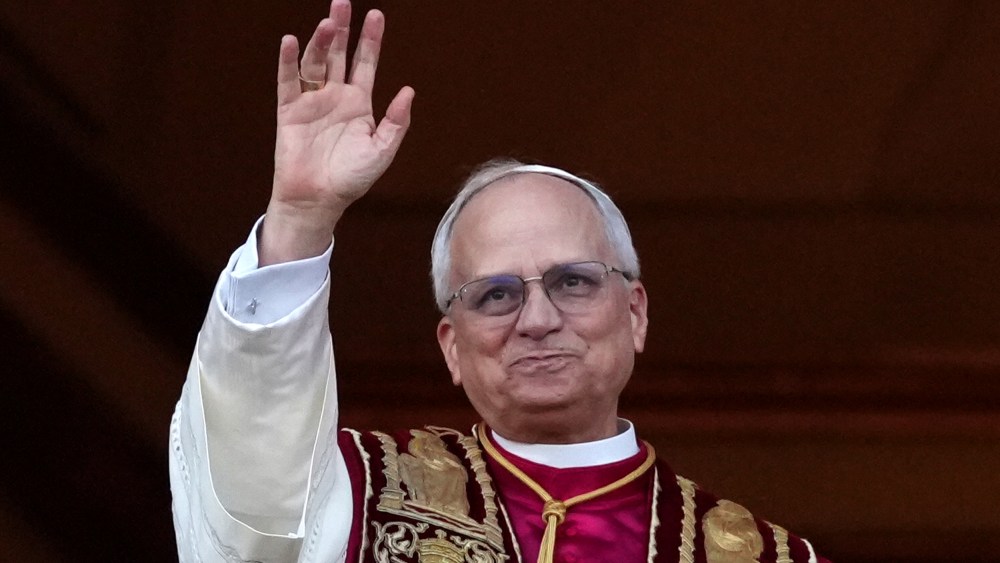Even the Pope is worried about the news business.
In an era when news programming is often seen as polarizing and outspoken hosts and anchors can serve to pull audiences apart, a group of the world’s most prominent news executives flew to Rome to offer some commitments to ideals such as fellowship and truth — even as market forces make such promises more difficult to keep.
The news chiefs traveled to a “World Meeting on Human Fraternity,” an event in its third year that takes place in 2025 in the wake of Pope Leo XIV‘s recent comments that a lack of hope can result from “the fact that we fixate on a certain rigid and closed way of seeing things.” Among those who were invited were Mark Thompson, CEO of CNN; David Rhodes, executive president of Sky News Group; Jay Wallace, president and executive editor of Fox News Channel; Tom Cibrowski, president of CBS News; Joseph Kahn, executive editor of The New York Times; Jerome Fenoglio, director of Le Monde; Graham Ellis, deputy director of BBC Radio; and Maria Ressa, co-founder and CEO of Rappler, an upstart digital news site based in Manila.
The job of delivering the news has only grown more fraught in recent years. “The basic definition of journalism — the kind I learned at journalism school in Boston — was ‘Who,’ ‘What’, “When,’ ‘Where,’ ‘Why.’ Tell the full story of what happened,” Cibrowski said during his remarks. “Alas, in these very challenging and fractured times, that is not always the case. Today’s media landscape has grown increasingly partisan, with many news organizations evolving into advocacy platforms that cater to and reinforce the beliefs of like-minded audiences. At the same time, we are immersed in a relentless 24-hour news cycle, where there is a constant expectation that people can access and consume real-time coverage at any hour of the day or night.”
In an era when more one-time TV viewers turn to streaming for on-demand consumption of their favorite dramas, comedies and movies, news is one of the few programming formats that captures a large audience of simultaneous viewers — something advertisers continue to crave. At the same time, the U.S. and the world are grappling with populist political movements, noticeable shifts in the health of the environment and a rise in everyday violence. The ability of any single person to create a media business also means that the industry is navigating through increased fragmentation, as well as a movement of consumers to content sources that speak specifically to their interests and political beliefs.
Comcast issued a memo Friday from some of its most senior executives telling staffers that “we need to do better” when discussing and analyzing difficult events. The company cut ties with political analyst Matt Down earlier this week after he said that conservative activist Charlie Kirk, who was murdered at a college event, promoted “hate speech” during a segment on MSNBC. “That coverage was at odds with fostering civil dialogue and being willing to listen to the points of view of those who have differing opinions,” said the memo, issued by Comcast CEO Brian Roberts, company president Mike Cavanagh, and Mark Lazarus, who will be CEO of the new spin off Versant, which will include MSNBC. “We should be able to disagree, robustly and passionately, but, ultimately, with respect.”
CNN’s Thompson, according to a read-out of prepared remarks, made the case for more support for delivery of news to broader audiences. The rise of content outlets that cater to narrower audiences and that hinge on subscriptions for access have undermined the economics of traditional news, he said. The “The age of broadcasting — the age of the serendipitous sower of news and culture and education through free-to-air radio spectrum and other forms of free or cheaply available mass media — is in decline almost everywhere and over time may cease to play a part altogether in the lives of much of humanity.”
Fox News’ Wallace said his company was mindful that “dignity requires we treat people not as characters or caricatures… but as individuals. We all must remind ourselves, that we cannot reduce their lives to quick clips, or captions.”
The executives were able to meet with Pope Leo in a private audience that included others, according to a person familiar with the matter.
Several seemed inspired to pledge to meet a higher bar. “Truth and facts are essential — but they’re not enough on their own. We must deliver them with compassion and an open mind, with clear eyes that see each story objectively and a determination to report without agenda,” said Cibrowski. “Journalism carries an incredible responsibility, and we must meet that responsibility with seriousness, integrity, and care.”

